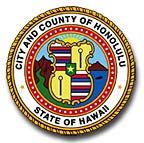 | |||||||||
|
|
A supercenter, as defined in the resolution introduced last month, is any store occupying more than 90,000 square feet, with more than 20,000 square feet dedicated to grocery sales, and more than 25,000 items. "A superstore of that magnitude would definitely impact any local community," said Dela Cruz. "We need to start thinking about long-term impacts." But Arkansas-based Wal-Mart Stores Inc. and authors of the bill seem to define "supercenters" differently when it comes to size. The Wal-Mart store in Pearl City measures about 148,000 square feet. Wal-Mart currently has no supercenters in Hawaii, though they are being rolled out rapidly across the mainland, where they average 185,000 square feet. Wal-Mart says its average discount store nationwide is about 101,000 square feet, with about 120,000 items. Sam's Clubs typically measure about 130,000 square feet. While authors of the bill swear that it's not targeted at Wal-Mart or any one business in particular, backers of the measure are notoriously anti-Wal-Mart. Supporters of the resolution include Kapolei First, a small activist group that rallied to try to stop Wal-Mart from building what they said was a "supercenter" at the corner of Makakilo Drive and Farrington Highway in Kapolei. Wal-Mart had said several times the proposed Kapolei store was not a "supercenter," but just a regular-format discount store like its others in Hawaii. Kapolei First is pushing for the bill's passage. Spokeswoman Carolyn Golojuch said she would not give up her grassroots campaign against Wal-Mart -- she continues to gather signatures for a petition. "Everyone with common sense knows that this particular intersection is just overloaded," said Golojuch. "To me, it was getting out of hand." The group even enlisted the pro-bono services of Lex Smith, an attorney at Kobayashi, Sugita & Goda, to lobby for the resolution. Other backers include the United Food and Commercial Workers Local 480. In the United States, Wal-Mart is nonunion. Pat Loo, president of UFCW, said the group would testify on behalf of the resolution. "I certainly think we have enough of them (big-box stores) here," Loo said. "But we don't understand the entire impact. There should be some sort of moratorium at this time, so we can look at the impact on our island and our communities." Councilwoman Ann Kobayashi, who also introduced the bill, said she believes such a law is necessary because of a supercenter's potential impact on small businesses. Turlock is the latest example of a city government that has stopped Wal-Mart from entering its borders. The language of the Honolulu resolution, says attorney Smith, is modeled after the one that was passed in Turlock, Calif., a small suburb 85 miles southeast of San Francisco. The Turlock law -- enacted two years ago -- prohibits stores bigger than 100,000 square feet from devoting more than 5 percent of floor space to groceries. It was backed by labor unions and neighborhood grocery stores opposing a proposed Wal-Mart supercenter in Turlock. Wal-Mart unsuccessfully challenged Turlock's law in state appeals court, and then at the California Supreme Court. In July, the Supreme Court rejected Wal-Mart's appeal. In Honolulu, the resolution would be the first of its kind. It was introduced on July 20, and referred to the zoning committee, but has not been scheduled for a hearing yet. Councilman Charles Djou, chairman of the zoning committee, says he opposes the bill because it targets Wal-Mart, and that city government should not regulate certain business models. "What this is effectively trying to do is prohibit a particular type of business," he said. "If people don't like Wal-Mart, don't shop there. But I don't think we should be legislating that people should not shop at a particular store, or that it shouldn't be allowed in a certain community."
© Honolulu Star-Bulletin -- https://archives.starbulletin.com
| Tools
| |||||||
 | |||||||||


